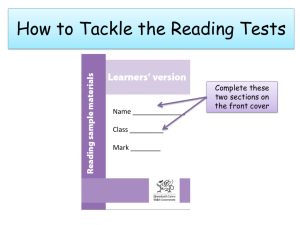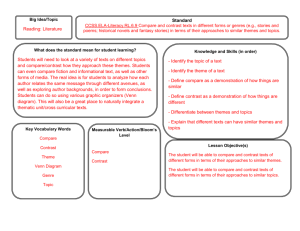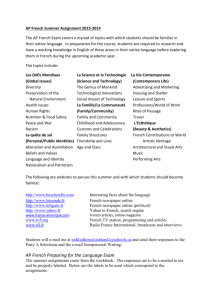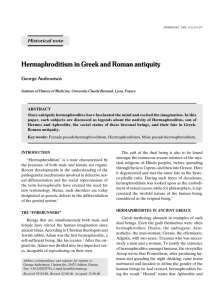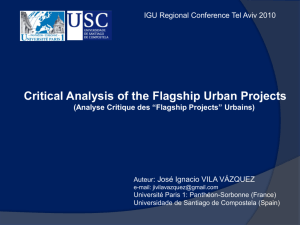Department of French
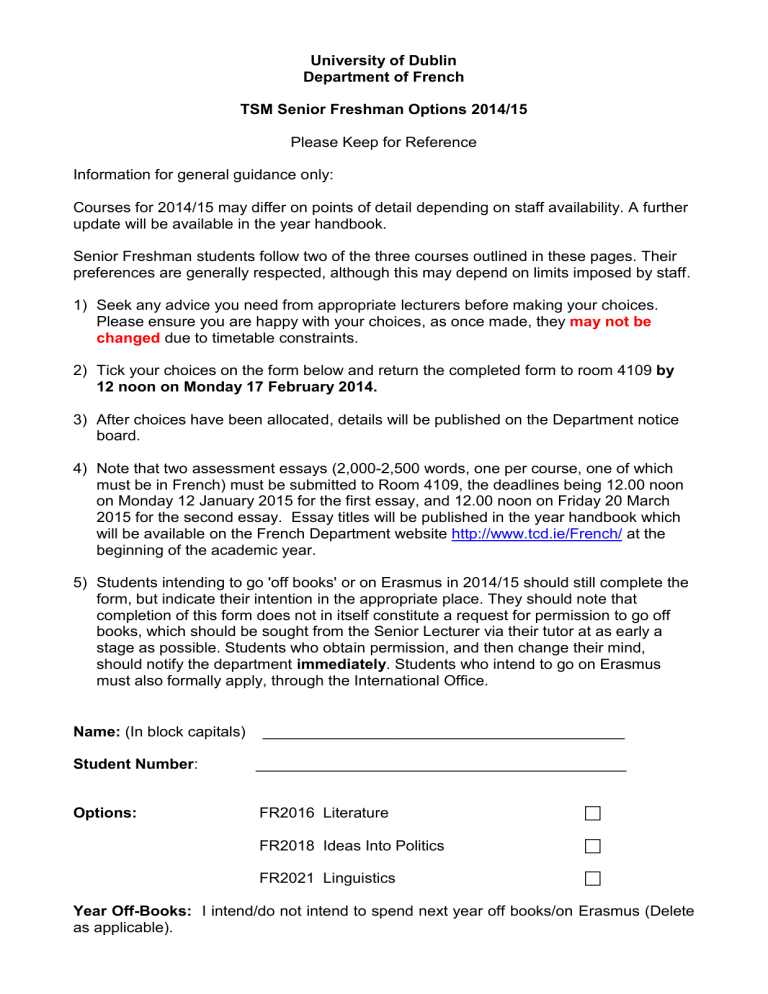
University of Dublin
Department of French
TSM Senior Freshman Options 2014/15
Please Keep for Reference
Information for general guidance only:
Courses for 2014/15 may differ on points of detail depending on staff availability. A further update will be available in the year handbook.
Senior Freshman students follow two of the three courses outlined in these pages. Their preferences are generally respected, although this may depend on limits imposed by staff.
1) Seek any advice you need from appropriate lecturers before making your choices.
Please ensure you are happy with your choices, as once made, they may not be changed due to timetable constraints.
2) Tick your choices on the form below and return the completed form to room 4109 by
12 noon on Monday 17 February 2014.
3) After choices have been allocated, details will be published on the Department notice board.
4) Note that two assessment essays (2,000-2,500 words, one per course, one of which must be in French) must be submitted to Room 4109, the deadlines being 12.00 noon on Monday 12 January 2015 for the first essay, and 12.00 noon on Friday 20 March
2015 for the second essay. Essay titles will be published in the year handbook which will be available on the French Department website http://www.tcd.ie/French/ at the beginning of the academic year.
5) Students intending to go 'off books' or on Erasmus in 2014/15 should still complete the form, but indicate their intention in the appropriate place. They should note that completion of this form does not in itself constitute a request for permission to go off books, which should be sought from the Senior Lecturer via their tutor at as early a stage as possible. Students who obtain permission, and then change their mind, should notify the department immediately . Students who intend to go on Erasmus must also formally apply, through the International Office.
Name: (In block capitals) __________________________________________
Student Number : ___________________________________________
Options: FR2016 Literature
FR2018 Ideas Into Politics
FR2021 Linguistics
Year Off-Books: I intend/do not intend to spend next year off books/on Erasmus (Delete as applicable).
Literature
(Dr Alyn-Stacey, Dr Lukes, Dr Opelz, Professor Scott)
This course has two main goals. Firstly, it aims to introduce students to the main genres of
French literature, in a broadly chronological framework and in terms of the relevant issues of critical theory. This function of the course is served primarily by the lecture series.
Secondly, it aims to engage in close reading of the prescribed texts. This function is served primarily by the seminars. The texts are those listed below.
The course begins with an examination of Du Bellay’s Les Antiquitez de Rome (1558 ) , a seminal work, which met with European recognition. These lectures consider the virtuoso use of the sonnet to articulate a range of universal and trans-historical themes about
Man’s condition and place in the universe.
The Golden Age of French theatre is undoubtedly the seventeenth century, or Grand
Siècle . Analysis of social satire in Molière’s grande comédie , Le Misanthrope , allows us to examine themes such as marriage, friendship, happiness and morality. Moving from comedy to tragedy, an examination of Corneille’s
Le Cid allows us both to analyse the dramaturgical conventions of the time and
Corneille’s complex portrayal of the human condition.
In the Hilary Term, we begin in the nineteenth century with Flaubert’s
Madame Bovary , and examine the novelistic norms against which the Nouveau Roman in the twentieth century reacts. Nathalie Sarraute’s Le Planétarium explores further the complex relationship between narration, character and reader in the French novel.
Baudelaire’s poetry will be taken as a focus for the study of metaphor in poetry, in particular in relation to poetic form, synaesthesia, and certain key themes (such as the ci ty, and the poet’s understanding of the universe).
Texts
Du Bellay, Joachim, Les Antiquitez de Rome (in Les Regrets / Les Antiquités de Rome , ed. Françoise Joukovsky, (Paris, Champion)
Molière, Le Misanthrope (Paris, GFFlammarion, Nº 981)
Corneille, Le Cid (Paris, Classiques Larousse)
Flaubert, Gustave, Madame Bovary (Paris, GFFlammarion, Nº 657)
Sarraute, Nathalie, Le Planétarium (Paris, Gallimard, Folio, Nº 92)
Baudelaire, Charles, Les Fleurs du Mal (Paris, GFFlammarion, Nº 527)
2
Ideas Into Politics
(Dr Alyn Stacey, Dr Arnold, Dr Hanrahan, Dr Opelz)
The purpose of this course is twofold. Firstly, it aims to acquaint students with the ideological traditions of modern France, stretching back to the Renaissance and forward to the post-war period. Secondly, it aims to encourage close reading of texts, and to develop skills in the analysis of arguments, and of the suppositions and values embedded in them. This function is served primarily by the seminars. With the exception of Pascal’s Pensées and Voltaire ’s
Lettres philosophiques , all texts required for this course will be available in the form of an
Anthology available from the local pages of the Department
’s website.
The Ideas into Politics annual examination comprises both essay-style questions and commentaries. For the commentaries, students will be asked to place the extract in its historical context; to analyse its form and content; and to discuss it in relation to the themes of the course. Whether a particular subject-area is examined by essay or commentary may vary.
Texts and Themes
Michaelmas Term
Montaigne, Essais ( De la coustume et de ne changer aisément une loy receüe; Des
Cannibale s)
Pascal, Pensées
Voltaire, Lettres philosophiques
Hilary Term
The French Revolution
Napoleon and the First Empire
From Restoration to Republic, 1815-48
Napoleon III and the Second Empire (1848-70)
Intellectuals against the Republic (1871-1914)
‘Les Guerres franco-françaises’ and the Dreyfus affair
‘Neither Right nor Left’: Politics in the Interwar Years (1918-44)
Resistance and Collaboration (1940-44)
Intellectuals and Decolonisation
(Short texts on these themes can be found in the course anthology, on the French
Department’s website)
3
Varieties of Contemporary French (Linguistics)
(Dr Hoare)
The purpose of this course is to show that French is a multi-faceted social instrument which may be delicately modified to suit the multitude of situations in which it is used on a daily basis. The French language, like any other language in current use, is not a petrified object, but a malleable organism which responds to the needs and demands of its users.
In addition to looking at the factors which have produced the mainstream variety of
French, official standard French, the course looks at and evaluates attempts to control the language and also explores varieties of French which may be encountered but which differ in some way from Standard French. The concept of variation in language is considered and the various factors which determine the way in which language is used in a particular set of circumstances are identified (speech, writing, computer-mediated communication).
The influence of geographical origin (with particular reference to the languages of France and regional and dialectal French), age, sex, socioeconomic status and register will be examined in detail.
The main objective of this course is to give a deeper understanding of the French language as it exists today. There is no single course-book, but the following books all have useful sections on the issues to be considered, and these will be supplemented with up to date journal articles which will be made available to students in electronic format.
Selected Texts
Ager D. (1990) Sociolinguistics and Contemporary French , Cambridge University Press
Ball R. (1997) The French-Speaking World , London and New York, Routledge
Lodge R. A. (1993) French: From Dialect to Standard , London and New York, Routledge
Lodge R., Armstrong N, Ellis Y, Shelton J. (1997) Exploring the French Language ,
London, Arnold
Oxford M. (1990) Varieties of Contemporary French, Basingstoke, Macmillan
Sanders C. (ed) (1995) French Today: Language in its Social Context, Cambridge,
Cambridge University Press
4

